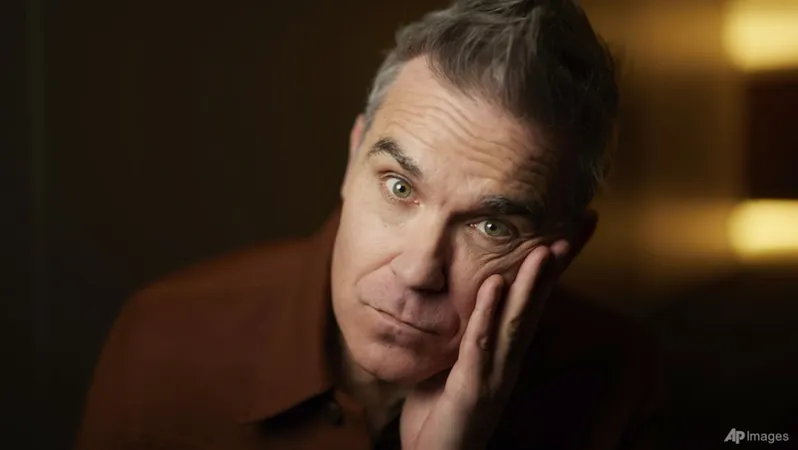
Robbie Williams Opens Up About Fame's Dark Side: 'It's a Matrix-Bending, Washing-Machine Fame'
2024-12-21
Author: Siti
Robbie Williams on the Emotional Rollercoaster of Fame
In a recent interview, the charismatic British singer-songwriter Robbie Williams revealed the emotional rollercoaster he experiences following each screening of his new biopic, "Better Man." The film, which narrates his extraordinary journey as a pop star and former Take That member, has left him deeply reflective. After a particularly moving premiere, he realized he couldn't be "the crying guy" at every showing, but his moments of vulnerability are unavoidable.
Williams candidly admits that the emotions run high during these screenings, heightened by factors such as jet lag and the presence of his bandmates. "In real life, I don’t cry that much," he quipped with a smile, showcasing his self-awareness in navigating the complexities of fame.
Innovative Storytelling in "Better Man"
The uniqueness of "Better Man" derives from an unexpected twist: the film's depiction of Williams involves a computer-generated chimpanzee representing him, while his own voice accompanies the character. Directed by Michael Gracey, known for "The Greatest Showman," the film employs cutting-edge motion capture technology, leading to a thought-provoking portrayal of Williams’s life and struggles.
Set to hit select theaters in the U.S. on December 25 and expand nationwide on January 10, "Better Man" offers an intriguing and R-rated look into the poignant realities of pop superstardom.
Fame’s Toll on Mental Health
Williams has long been open about the toll fame takes on mental health, as explored in his recent Netflix documentary series "Robbie Williams." The series highlights his battles with addiction, self-doubt, and the often toxic environment created by the tabloid culture of the 2000s.
Furthermore, Williams has garnered attention for another notable achievement: he is a first-time Golden Globe nominee for Best Original Song with his track "Forbidden Road" from "Better Man." This recognition could signal a new chapter in his career, potentially elevating his profile in the U.S. market, where he feels less recognized than in Europe.
Reflections on Fame’s Dual Nature
Reflecting on fame, Williams stated, "There’s something about this matrix-bending, washing-machine fame that’s deeply unhealthy." He described the inevitable struggle of spending decades untangling the impact of the earlier years in the public eye, a journey he has navigated while maintaining transparency about his experiences.
Williams also expressed empathy for late One Direction member Liam Payne, sharing insights from his struggles with mental health in the industry. He acknowledged that while fame can be debilitating, his current relationship with it is vastly different from his younger years. "I wouldn't trade it for the world," he confessed, appreciating the opportunities fame affords him today, balanced by a more mature perspective.
Preparing for the Future
As Williams prepares for his upcoming worldwide tour, he aims to maintain his mental well-being, acknowledging the growth he has experienced. "The lunatic that was in the car is still in the car, but he doesn’t drive anymore," he shared, hinting at a newfound wisdom that comes with age and experience.
Conclusion: A Testimony to Resilience
In conclusion, Robbie Williams continues to shed light on the bittersweet nature of fame. His story is a testament to resilience and the human spirit, proving that even amidst the glitz and glamour, it is essential to prioritize mental health and authenticity. Mark your calendars for "Better Man," a film that promises to resonate with anyone who has ever grappled with the complexities of life in the spotlight.




 Brasil (PT)
Brasil (PT)
 Canada (EN)
Canada (EN)
 Chile (ES)
Chile (ES)
 España (ES)
España (ES)
 France (FR)
France (FR)
 Hong Kong (EN)
Hong Kong (EN)
 Italia (IT)
Italia (IT)
 日本 (JA)
日本 (JA)
 Magyarország (HU)
Magyarország (HU)
 Norge (NO)
Norge (NO)
 Polska (PL)
Polska (PL)
 Schweiz (DE)
Schweiz (DE)
 Singapore (EN)
Singapore (EN)
 Sverige (SV)
Sverige (SV)
 Suomi (FI)
Suomi (FI)
 Türkiye (TR)
Türkiye (TR)